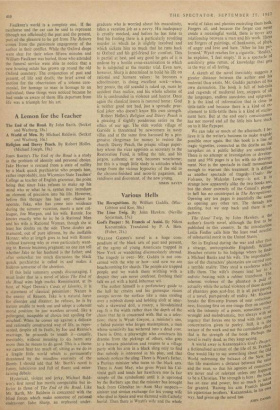A Lemon for the Teacher
The End of the Road. By John Barth. (Seeker and Warburg, 18s.) A World of Men. By Michael Baldwin. (Seeker and Warburg, I6s.) Religion and Davey Peach. By Robert Holies. (Michael Joseph, 18s.) JOHN BAR-rit's The End of the Road is a study in the problem of identity and personal choice. Jake Horner is rescued from a state of nullity by a black quack psychiatrist who propels him, rather improbably, into Wicomico State Teachers' College as teacher of English grammar, the point being that since Jake refuses to make up his mind who or what he is, syntax may introduce an element of precision into his life. However, before this therapy has had any chance to operate, Jake, who has come into residence during the summer vacation, meets a new col- league, Joe Morgan, and his wife. Rennie. Joe knows exactly who he is; he is Rational Man and his wife is Rational Woman, though she at least has doubts on the side. These doubts are manured, out of pure idleness, by the ineffable Horner. who at length goes to bed with Rennie without knowing why or even particularly want- ing to. Rennie becomes pregnant; no one can tell whether Jake or her husband is the father; and after somewhat too much discussion the black quack psychiatrist is called in and makes a hideous nonsense of the abortion.
If this bald summary sounds discouraging, I must insist that as a novel of ideas The End of the Road wins high marks. Reminiscent, at its best, of Nigel Dennis's Cards of Identity, it is a statement of classical pessimism: Nature is the enemy of Reason. Jake is a natural force for disorder and disaster; he refuses, he is by nature unable to work out and adopt a coherent moral position; he just wanders around, like a poltergeist, incapable of choice but spoiling for mischief. When he comes up against a delicate and rationally constructed way of life, as repre- sented. despite all its faults, by Joe and Rennie's marriage, he proceeds to smash it—casually, inevitably, without meaning to do harm any more than he means to do good. This is a theme we cannot hear too much of. sitting as we do in a fragile little world which is permanently threatened by the mindless enormity of the Bomb. I should add that Mr. Barth's novel is funny, lubricious and full of fluent and enter- taining debate.
Hysterical, violent and jerky, Michael Bald- win's first novel has merits comparable but in- ferior to those of The End of the Road. Like Mr. Barth, Mr. Baldwin is concerned with the blind forces which make nonsense of rational endeavour. John Sharp, an orphaned under- nder- graduate who is worried about his masculinity, takes a vacation job as a navvy. His inadequacy is cruelly mocked, and before he has time to find his footing there is a particularly revolting murder in which he is slightly involved and which sickens him so much that he runs back to Oxford and his girl-friend for comfort. This is partial at best, and any good he gets of it is undone by a hostile cross-examination to which he is subjected at the murder trial. Even now, however, Sharp is determined to build his life on rational and humane values: he becomes a schoolmaster, is doing excellent work—when, hey presto, the old scandal is raked up, more by accident than malice, and his whole scheme of life is confounded in violence and horror. Once again the classical lesson is rammed home: God is neither good nor bad, just a sporadic prac- tical joker who doesn't know His own strength.
Robert Holles's Religion and Davey Peach is a pleasing if slightly ponderous satire on the ethics of our age. The olde worlde village of Garside is threatened by newcomers in nasty villas and at the same time harassed by a pro- gressive clergyman for money to restore the church. Davey Peach, the priapic village paper- boy whom the vicar appoints as secretary to the Restoration Fund, is telling the tale, and his jargon, authentic or not, becomes wearisome; but this is a tough little study in attitudes which range from the vicious hypocrisy of the old to the chrome-finished and neon-lit paganism, all randiness and discontent, of the new young.
SIMON RAVEN










































 Previous page
Previous page